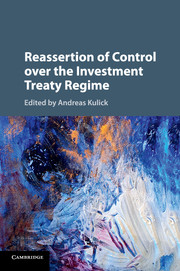Book contents
- Frontmatter
- Contents
- List of Contributors
- Preface
- PART I Introduction, Theory and Domestic Law Approaches
- PART II Procedural Aspects and Avenues of Reassertion
- PART III Substantive Aspects and Avenues of Reassertion
- 7 Masters of Puppets? Reassertion of Control through Joint Investment Treaty Interpretation
- 8 Systemic Integration: An Instrument for Reasserting the State's Control in Investment Arbitration?
- 9 Reasserting Control through Withdrawal from Investment Agreements: What Role for the Law of Treaties?
- 10 Legitimate Regulatory Interests: Case Law and Developments in IIA Practice
- 11 State Controls over Available Remedies in Investor-State Arbitration
- PART IV Reassertion of Control: Policy and Trends
- Index
9 - Reasserting Control through Withdrawal from Investment Agreements: What Role for the Law of Treaties?
from PART III - Substantive Aspects and Avenues of Reassertion
Published online by Cambridge University Press: 12 January 2017
- Frontmatter
- Contents
- List of Contributors
- Preface
- PART I Introduction, Theory and Domestic Law Approaches
- PART II Procedural Aspects and Avenues of Reassertion
- PART III Substantive Aspects and Avenues of Reassertion
- 7 Masters of Puppets? Reassertion of Control through Joint Investment Treaty Interpretation
- 8 Systemic Integration: An Instrument for Reasserting the State's Control in Investment Arbitration?
- 9 Reasserting Control through Withdrawal from Investment Agreements: What Role for the Law of Treaties?
- 10 Legitimate Regulatory Interests: Case Law and Developments in IIA Practice
- 11 State Controls over Available Remedies in Investor-State Arbitration
- PART IV Reassertion of Control: Policy and Trends
- Index
Summary
A. Introduction
When it comes to reasserting control over investment relations, there is no more dramatic measure open to States than seeking to terminate agreements which provide for investment protection and binding third-party dispute settlement. While the many bilateral investment treaties (BITs) concluded in the past few decades may have affected the content and scope of the minimum standard of protection to which foreigners are entitled under general international law, the backbone of the substantive rights enjoyed by investors around the world remains treaty law. Likewise, disputes opposing States and investors can only be brought before international forums if those States give their consent, which they typically do by concluding BITs. Treaty termination may thus come across as an intuitive and effective means to grasp the nettle: by getting rid of the treaties that constrain them, States can recover the room for policy choice that has been taken away by a system of investment protection with which many have become disillusioned.
Treaty termination is, however, a constrained means to reassert control over investment relations, at least in the short term. In S.S. Wimbledon, the Permanent Court of International Justice described the ‘right of entering into international engagements’ as an ‘attribute of State sovereignty’, but that judgment made it abundantly clear that once this attribute is exercised, States cannot easily turn back. Indeed, the contemporary law of treaties makes international agreements particularly resilient – or as resilient as the parties wish them to be. To consider to what extent this proposition holds true in relation to investment treaties, this chapter looks into two ways in which States have sought to regain control over their investment relations. The first and most obvious is by attempting to terminate specific BITs by which they are bound. The second is by denouncing the Washington Convention on the Settlement of Investment Disputes between States and Nationals of Other States (the ICSID Convention) with a view to impairing or affecting the application of compromissory clauses in existing BITs.
B. Termination of BITs
(1) Denunciation and Sunset Clauses
The termination of BITs is a matter regulated by the general law of treaties, which is authoritatively articulated by the 1969 Vienna Convention on the Law of Treaties (VCLT).
- Type
- Chapter
- Information
- Reassertion of Control over the Investment Treaty Regime , pp. 209 - 229Publisher: Cambridge University PressPrint publication year: 2016

